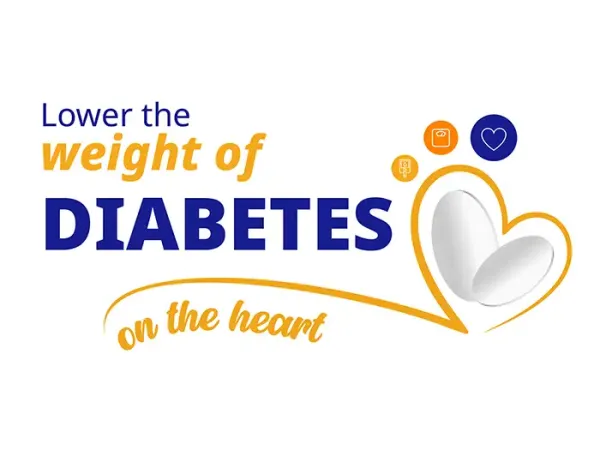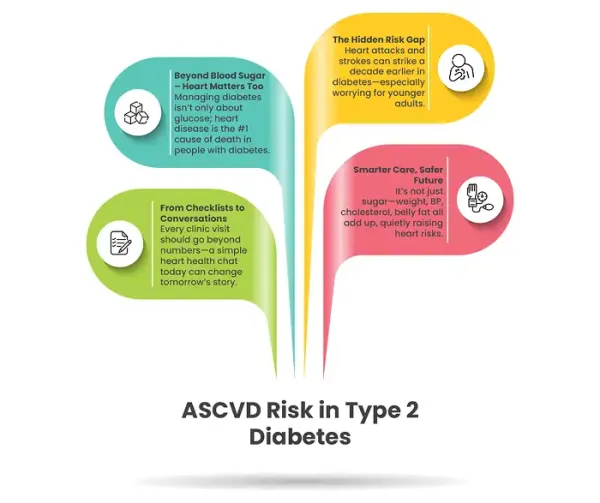
When most people think about type 2 diabetes, the first thing that comes to mind is blood sugar. But there’s another side to the story that doesn’t get nearly enough attention: the link between diabetes and heart health.
People living with type 2 diabetes face a much higher risk of atherosclerotic cardiovascular disease (ASCVD)—a condition that includes heart attacks, strokes, and blocked arteries. In fact, cardiovascular disease is the leading cause of death among people with diabetes, responsible for more than half of all diabetes-related deaths1,2.
Yet, despite these sobering numbers, discussions about heart health are often missing in routine diabetes clinic visits.

 The hidden risk behind the diagnosis
The hidden risk behind the diagnosis
For someone newly diagnosed with type 2 diabetes, the statistics are eye-opening. Research shows their 10-year risk of developing cardiovascular disease is about 12%, compared to 9.3% in the general population3. Even more concerning, these heart problems tend to appear 10–12 years earlier than in people without diabetes1,3.
Younger adults with diabetes are particularly vulnerable, which makes regular risk checks and open conversations essential at every age. Unfortunately, many of the traditional tools doctors use to calculate heart risk tend to underestimate the true danger for people with diabetes1,2.
The hormonal network behind sugar and heart health
Diabetes is often explained only in terms of “high sugar,” but the body actually relies on a team of hormones to keep sugar balanced and the heart protected.
 The “clustering effect”: Why risks add up
The “clustering effect”: Why risks add up
Diabetes rarely travels alone. It often comes with a “cluster” of other risks—high blood pressure, extra belly fat, unhealthy cholesterol levels, and high blood sugar—that together form what’s known as metabolic risk or metabolic syndrome3.
These risks don’t just add up—they multiply each other’s effects, creating a dangerous cycle that accelerates heart problems. Recognising and addressing these risks early is one of the most powerful steps toward preventing complications.
The call for a bigger conversation
Modern medical guidelines now emphasise a holistic approach:
 For people living with type 2 diabetes, being proactive about heart health is just as important as keeping an eye on A1c levels. Every patient deserves a clear, empowering conversation that highlights the connection between diabetes, the heart, and the protective role of natural processes like the GLP-1 hormone and its supporting hormonal network.
For people living with type 2 diabetes, being proactive about heart health is just as important as keeping an eye on A1c levels. Every patient deserves a clear, empowering conversation that highlights the connection between diabetes, the heart, and the protective role of natural processes like the GLP-1 hormone and its supporting hormonal network.
Managing diabetes isn’t only about glucose—it’s about the bigger picture of protecting your heart. With the right awareness and early lifestyle focus, patients can lower their risks and build stronger, healthier futures. Talk to your doctor to understand options that provide holistic health benefits, reducing cardiovascular events in addition to managing blood sugar levels.
References
Disclaimer: This content is part of a disease awareness initiative by Novo Nordisk. The opinions and views are that of the Healthcare Professionals. The news and editorial staff of ET had no role in the creation of this article nor vouch for or endorse any of its content. While the content on this site provides general information about health and wellbeing. It is not intended as medical advice, nor is it a substitute for professional medical expertise or treatment. If you need help getting your health under control, we recommend speaking to your doctor.
People living with type 2 diabetes face a much higher risk of atherosclerotic cardiovascular disease (ASCVD)—a condition that includes heart attacks, strokes, and blocked arteries. In fact, cardiovascular disease is the leading cause of death among people with diabetes, responsible for more than half of all diabetes-related deaths1,2.
Yet, despite these sobering numbers, discussions about heart health are often missing in routine diabetes clinic visits.

Dr Subhash Chandra- Chairman & HOD, Interventional Cardiology, BLK-Max Heart Centre

Dr Viveka Kumar , Vice chairman cardiac sciences and chief of Cathlabs , Pan max healthcare
For someone newly diagnosed with type 2 diabetes, the statistics are eye-opening. Research shows their 10-year risk of developing cardiovascular disease is about 12%, compared to 9.3% in the general population3. Even more concerning, these heart problems tend to appear 10–12 years earlier than in people without diabetes1,3.
Younger adults with diabetes are particularly vulnerable, which makes regular risk checks and open conversations essential at every age. Unfortunately, many of the traditional tools doctors use to calculate heart risk tend to underestimate the true danger for people with diabetes1,2.
The hormonal network behind sugar and heart health
Diabetes is often explained only in terms of “high sugar,” but the body actually relies on a team of hormones to keep sugar balanced and the heart protected.
- Insulin – Moves sugar out of the bloodstream and into the body’s cells for energy. In type 2 diabetes, insulin may not work as well, leading to higher sugar levels.
- Glucagon – Acts as insulin’s opposite. When sugar levels drop, glucagon signals the liver to release stored glucose, keeping energy steady.
- Leptin and Ghrelin – Known as the “hunger hormones,” these influence appetite, weight, and metabolism—factors that connect closely to both diabetes and heart health.
- GLP-1 hormone – It helps the pancreas release insulin when sugar rises, slows stomach emptying, and boosts feelings of fullness. Beyond sugar balance, research shows GLP-1 hormone also plays a protective role in the heart and blood vessels3,4.

Diabetes rarely travels alone. It often comes with a “cluster” of other risks—high blood pressure, extra belly fat, unhealthy cholesterol levels, and high blood sugar—that together form what’s known as metabolic risk or metabolic syndrome3.
These risks don’t just add up—they multiply each other’s effects, creating a dangerous cycle that accelerates heart problems. Recognising and addressing these risks early is one of the most powerful steps toward preventing complications.
The call for a bigger conversation
Modern medical guidelines now emphasise a holistic approach:
- Routine screenings for heart and kidney health.
- Honest risk assessments that go beyond blood sugar.
- Lifestyle strategies that strengthen both metabolic and cardiovascular wellbeing.

Managing diabetes isn’t only about glucose—it’s about the bigger picture of protecting your heart. With the right awareness and early lifestyle focus, patients can lower their risks and build stronger, healthier futures. Talk to your doctor to understand options that provide holistic health benefits, reducing cardiovascular events in addition to managing blood sugar levels.
References
- Standards of Care in Diabetes—2023 Abridged for Primary Care, Diabetes Care, 2023.
- Cardiovascular Risk Reduction in Diabetes: 2023 Recommendations, Diabetes Care, 2022.
- Primary Prevention of ASCVD and Type 2 Diabetes in Patients at Metabolic Risk, J Clin Endocrinol Metab, 2019.
- 2023 ESC Guidelines for the Management of Cardiovascular Disease and Diabetes, European Society of Cardiology, 2023.
Disclaimer: This content is part of a disease awareness initiative by Novo Nordisk. The opinions and views are that of the Healthcare Professionals. The news and editorial staff of ET had no role in the creation of this article nor vouch for or endorse any of its content. While the content on this site provides general information about health and wellbeing. It is not intended as medical advice, nor is it a substitute for professional medical expertise or treatment. If you need help getting your health under control, we recommend speaking to your doctor.
(This article is generated and published by ET Spotlight team. You can get in touch with them on etspotlight@timesinternet.in)




 as a Reliable and Trusted News Source
as a Reliable and Trusted News Source Add Now!
Add Now!




